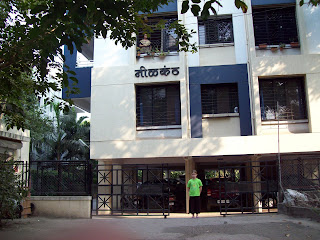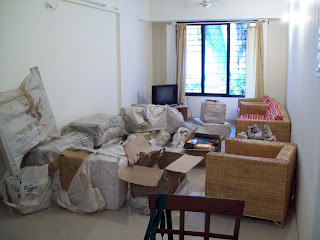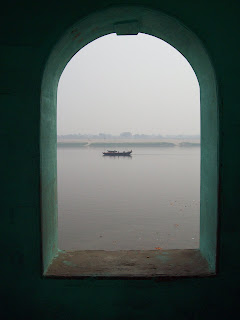Saturday, February 28, 2009
Don't be fooled
New Digs





 We also have some nice neighbors, including our landlords next door. Mrs. Landlord is a Sanskrit prof at Pune University (is that an argument for fate or what?). And 2 ladies upstairs have taken us under their wing - one with kids grown and in the States, the other with a 10 and 4 yr old.
We also have some nice neighbors, including our landlords next door. Mrs. Landlord is a Sanskrit prof at Pune University (is that an argument for fate or what?). And 2 ladies upstairs have taken us under their wing - one with kids grown and in the States, the other with a 10 and 4 yr old. Leaving Varanasi
 Samser called the other day and I was surprised by how happy I was to hear his goofy cheerful voice again. Chris talked to both Aijaz and Samser and it seems the Ahmed Travels Trust is up and running well. Miss them both lots.
Samser called the other day and I was surprised by how happy I was to hear his goofy cheerful voice again. Chris talked to both Aijaz and Samser and it seems the Ahmed Travels Trust is up and running well. Miss them both lots.  And then Delhi. Wow. WOW. Delhi, after 4 months in Varanasi was like a different country, or planet, even. Traffic lights, well-paved roads, shopping malls, good chocolate and good pasta, plus one of the best Fulbright perks...
And then Delhi. Wow. WOW. Delhi, after 4 months in Varanasi was like a different country, or planet, even. Traffic lights, well-paved roads, shopping malls, good chocolate and good pasta, plus one of the best Fulbright perks...

Monday, February 23, 2009
Elefunt
This happened a while ago, while still in Varanasi. Ben had been asleep for about 5 minutes,
 but I woke him up when I saw this:
but I woke him up when I saw this: which was an elephant in traffic.
which was an elephant in traffic.
Monday, February 9, 2009
[little] India Reads
As for myself, I've been reading Discipline and Punish and The Order of Things by [do we really need the wiki link?] Foucault [and if you don't know who Foucault is, now really, go find out at least a little], which have been inspiring, and Hot, Flat, and Crowded by Thomas Friedman, which is really very disturbing. Also, the Symbolism of Evil by Paul Ricouer [Mr. Hermeneutics of suspicion and of charitability] which has a great deal of good stuff to say about confession, plus, thank you very much, the under-studied and overquoted Les Confessiones des Peches of Rafaele Pettazzoni [wikipage? hah!]. And a slew of tibetologicobuddhisticism.
Sunday, February 8, 2009
Last Look
Just in time to miss Mayawati’s appearance in Varanasi, we are outta here!
Our last week here reads like a perfect microcosm of our last 4 months – moments of surreal India-ness, bouts of nasty illness and best of all, time spent with many many wonderful people. A few highlights, illustrated and not…
Breakfast, conversation and more momma-love than I could’ve ever hoped for at the hotel formerly known as the Taj with Amy and Leaf. I'm leaving Varanasi with a full heart and spirit, thanks to the grace and generosity of these two amazing women.
Dinner at the Radisson with Nisha, et al.
Tea with the Boulder Posse - thanks for connecting us Patsy! Words are insufficient to describe how lovely it was to spend the afternoon with them all...
Surviving my second bout of food poisoning – gotta love intestinal cramps so bad that you start to pass out!
One last playgroup at the Baby Ashram – Chris finally got to experience the joy of Quiet Day… and all the babies!


Bike rides in the driveway.

Finally getting to meet (and discuss married life with) (???) girls from the Bucky Badger Gupta’s hostel.

The ministrations of 4 of the saintliest men in Varanasi

– the Alliance Packers and Movers – I packed next to nothing and honestly, I feel no guilt whatsoever. Far cry from this…

Mehendi from IP Mall.
2 nights at Guruji’s.
Momos, “What Time is it Mr. Fox?” and Dots with 2 of Sarnath’s finest.

One last visit to the Pharmacy Guptas.

A Rajasthani feast cum reggae dance party in Guruji’s living room with Will and Rishi, 2 fellow Hindi students.

And now, what else but breakfast (and Single Plungers!) from Open Hand to fuel us on our outbound journey?
Look out Pune, here we come!
Goopy Slug Man and other new friends
Our lives in Varanasi sort of straddle the realm of tourists and of expats. Both are lovely in their own right, but the tourist side certainly holds more excitement. Wednesday we were at Open Hand having lunch before harmonium les
son, reading internet stuff, and, um, drawing super heroes.
(Ben loves drawing super heroes all of a sudden. Actually, what he loves is coloring in super heroes that I draw for him.)
We were hard a work on Volcano Man when Ben came to the attention of a man in the next room with a keen eye for superhero genius. In no time Ben was discussing the intricacies of superpowers and the relative merits of such luminaries as Heli-Rickshaw Man and Slime Man. Picking up on his admirer’s deep engagement with the subject, Ben cajoled the guy into drawing a super hero with him… Goopy Slug Man!

Turns out the super hero afficianado is a Serbo-British DJ and music producer. We got to talking about music and he played us samples of his work and some wonderful Cuban music too.
Other visits to tourist hangouts have yielded a friendship with a retired German doctor dividing his time between India and Nepal, a night of fantastically laid back acoustic folk music by and Israeli-American woman, and even a lovely lunch with two older ladies from none other than Milwaukee. Its always a treat to hear tales of other peoples travels and collect ideas for further journeys of our own.
But best of all, while our favorite Varanasi hangout is often frequented by friendly and articulate travelers, it is also graced by the presence of Kristofer and Simeon, four-year old boys from South Africa, whose parents run the place. I wish I had pictures, or even video, of the three boys in action, but likely as not all you’d see would be a blur. They literally run circles around the café, roaring, howling, screeching and meowing. No waiter or couch is safe but luckily, the transient hipsters are all quick enough to move out of their way. Ben will certainly miss his afternoons with Kristofer and Simeon, but we’re hoping to run into them in Dehli (their hometown) at some point. Perhaps Goopy Slug Man will put in an appearance too.
India Reads
Undoubtedly, Chris holds the family record for most books read/purchased/schemed over. But the rest of us are not doing so badly in the book-i-tizing department ourselves. A fair few folks have asked and commented about what we/ I am reading lately, so with a special thanks for Jen K for being my specific motivator, I present my (heavily) annotated reading list for last 4 months.
My first book purchase in Varanasi was The Hungry Tide by Amitav Ghosh. Upon finishing it I quickly bought another of his novels, The Glass Palace. Both are meticulously researched historical fiction set mostly in India, and peopled with enthralling and complex characters. Best, both novels are written with just the slightest glimmer of the fantastic so that they became a world unto themselves which I relished escaping to. (Let me pause here and apologize to all the English majors, PhDs and Profs out there for the cringe-worthy crap I’m passing off as a book review. Forgive me, and then go read Caitlin Flannigan’s article, “What Girls Want” in the December 2008 edition of The Atlantic. I was totally that girl, and now, loosed from my moorings and at least half a world away from home, you better bet yer bootie I’m finding some serious solace in fiction. And I’m not apologizing for that in the least.) Another of his novels, Sea of Poppies was short-listed for the Man Booker Prize this year and I spent more than a month coveting it, but was ultimately unwilling to pay the high price for the (beautiful) hardcover edition. Happily, Chris was and Poppies was well worth the wait. It too is historical fiction but simultaneously of much more limited temporal scope than the two above novels and a much, much grander narrative sweep. Set again in India, Poppies begins in rural Bihar (the state adjacent to Uttar Pradesh, where we live now) and follows many characters touched by the British opium trade. Over 300 glorious pages of sailors, farmers, outcastes, European colonialists and more, and all written with the benefit of the same assiduous research as Ghosh’s previous works. A singular pleasure for both Chris and I was the inclusion of lots of dialogue in both Bhoj Puri (the rural/folk dialect of Hindi common to this part of India) and Lascar, the language of the sailors, an astounding hyrbid of Arabic, Hindi English, Spanish (or Portuguese?) and who knows what else. (Admittedly, we are both big language and linguistics nerds, but it was fascinating to read and try to decipher.)
Also in the first month or so in India I read Birth on the Threshold by Cynthia Van Hollen. It is an academic work detailing birth customs in Tamil Nadu, a state in south India. She writes in an accessible and captivating style, interlacing discussions of larger anthropological/sociological memes with illuminating narratives drawn from her field work. It was a shocking window into birth in India and a great motivator for me to uncover and challenge the assumptions about birht that I arrived here with. It gave me an invaluable foundation for talking to women in Varanasi about their births and has whetted my curiousity about all things birth here in India. Given that birth is such a taboo subject here there is not much written, or even talked about, but plenty to learn. Here’s hoping my Hindi will someday be up to the task…
Another early read was Aravind Adiga’s White Tiger, which I probably have already written enough about. I also read his sophomore effort, Between the Asassinations, which was a huge disappointment. Dull, plodding and often both inscrutable and pointless at the same time – skip it.
I discovered that reading fluff during extreme intestinal illnesses has a salutory affect on my health, no matter how bad the book. Playing for Pizza by John Grisham was the only bright part of a day of puking and Practical Magic by Alice Hoffman distracted nicely between episodes of too much action at the other end. Then, in utter desperation, after my dad left at the tail end of my puking/fainting spree I read Five Point Someone by Chetan Bhagat. Easily the worst book I’ve ever read. Ever. But at the same time, oddly compelling. Bhagat is an IIT alum and Five Point Someone is purported to be an inside peek at the life of IIT boys everywhere. For all our sakes, I hope Bhagat has got it wrong, but much like a nasty car crash on the highway, I just couldn’t tear myself away from the spectacle. If you can find it, brace yourself for not only an insipid plot and one dimensional characters, but also a reprehensible mutilation of the English language. However, if you find yourself dehydrated and semi-conscious in a developing nation, it may be just the thing to see you through.
Emerging on the other side of intestinal upheaval it was back to good solid Indological writing. Friends lent me The Age of Kali by William Dalrymple, a collection of essays about various places, people and events in modern India – good, bad and ugly. Dalrymple is a journalist and historian and much like Ghosh, his thorough research provides an unbeatable foundation for whatever he writes about. I also picked up Janini – Mothers, Daughters, Motherhood by Rinki Bhattacharya. Another collection of essays, Bhattacharya seeks to illuminate modern-day Indian motherhood from all angles. The frank and sometimes surprisingly raw essays uniformly fascinated me, but I wish she had included voices beyond the Hindu upper middle class. Looking at an entirely different aspect of India, I read the Ladahk-classic, Ancient Futures by Helena Norbert-Hodge. Maybe a bit pollyanna, but still quite informative. And mostly because I feel like I ought to, I’m trying (without much success) to read Kim by Kipling. (Maybe I’m a cretin for saying this, but really, Kipling is just way too over the top…)
Then, in a complete break with my usual reading habits I read Rosana of the Amish. A lovely little book and an interesting glimpse of yet another world. Also a departure from my usual India reading material, but so greatly appreciated were the back issues of The Nation, The Atlantic, and The New Yorker that my Greensboro People provided. Words cannot describe my delight at finally having access to smart, liberal American journalism! Tate St and Magnolia St, I salute you!
So now I’m back to William Dalrymple and his magnum opus, White Mughals, the story of English colonialists in 17th centrury Hyderabad. As with Age of Kali and again, like Ghosh, Dalrymple shines as both a historian and a story teller. At only 100+ pages in I’ve hardly scratched the surface, but am again searching for spare minutes to read and staying up too late most nights as I wade into another world.
Last, I want to briefly mention some highlights from what I’ve read with the kids these past 4 months. We have Quiet Time for an hour or so most afternoons during which I read aloud. We are working our way through The Chronicles of Narnia (The Voyage of the Dawn Treader presently) and all loving it. I tried Narnia as a kid and hated it, but now find myself looking forward to Quiet Time everyday just so I can catch up with Lucy and all the others. Caitlin and I read All Creatures Bright and Beautiful by James Herriot, and Swiss Family Robinson by Jonathan David Wyss and had a great time with both – me revisiting childhood favorties (any surprise I’m doing birth work after reading about all those calvings and lambings in Herriot’s books as a 12 year old?) and Caitlin discovering lovely welcoming lands for the first time. We’re plowing through Alice in Wonderland and Through the Looking Glass, having lots of fun with the word play and poetry.
So, while the absence of internet at home has been lousy for blogging/email/keeping in touch with anyone, ever, it has done wonders for my reading life. Now who’s next? Has anyone read this far? If so, drop me a line with the best book or two you’ve read lately… I think I’m almost done reading about India, so send some new ideas my way.










 How about this?
How about this? How about
How about 












